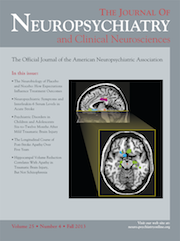Schizophrenia Versus Epileptic Psychosis
To the Editor: The association between epilepsy and schizophrenia-like psychosis has been studied since the 19th century, but many aspects of this relationship remain controversial and unknown.
A 38-year-old-female patient, with history of grand mal epilepsy since age 16 (asymptomatic for 14 years), was seen in an acute setting for auditory hallucinations and persecutory and mystical delusions. These symptoms had been developing for the last 6 months and had started 1 week after the discontinuation of her usual antiepileptic drug (carbamazepine 400 mg qd). There were no reports of seizures during this period. At admission, she was medicated with risperidone 4 mg qd. EEG, brain MRI, and blood work were normal. Given the normal ancillary exam results and the absence of seizures for 14 years, no antiepileptic drug was added to the above regimen. The diagnosis of schizophrenia was considered. She was discharged home, asymptomatic, 21 days after admission. On the day of her discharge, she had a grand mal seizure and was again committed. EEG showed left fronto-temporal electric brain activity dysfunction. She was medicated with valproate 500 mg bid and paliperidone 6 mg qd because of mild psychotic symptoms. She was discharged home 5 days later, asymptomatic. At follow-up, paliperidone was progressively discontinued, with no recurrence of the psychotic symptoms. Six months after paliperidone was stopped, she had another grand mal seizure, possibly due to defective compliance with antiepileptic medication. Psychotic symptoms re-emerged. She was committed, and medicated with risperidone 3 mg qd and oxycarbamazepine 600 mg bid, with total symptom remission within 5 days.
According to some studies, there is an increased risk of schizophrenia and schizophrenia-like psychosis in people with a history of epilepsy.1 People seem particularly liable to two types of psychosis: a chronic interictal psychosis that closely resembles schizophrenia; and episodic psychotic states, some of which may arise in close temporal relation with seizure activity.2
The more common by far is the postictal psychosis. This usually follows exacerbations, especially clusters, of complex partial seizures, sometimes without, but, more commonly, with generalization.2
In our case, a clear and intrinsic relationship between psychosis and epilepsy appears to exist. It remains unclear whether psychosis and epilepsy are comorbid or part of the same disease. Nevertheless, the age at onset of psychotic symptoms, its temporal relationship with antiepileptic medication discontinuation, EEG brain changes, the absence of previous psychiatric history, and the fast symptomatic improvement upon correct medication compliance favors the diagnosis of epileptic psychosis.
There are many mechanisms by which epilepsy may be associated with schizophrenia-like psychosis. It is likely that structural brain abnormalities underlie both epilepsy and psychosis, and that the seizures modify the presentation of the psychosis, and vice versa, thus producing a clinical picture of both an affinity and an antagonism between the two disorders.3
1 : Risk for schizophrenia and schizophrenia-like psychosis among patients with epilepsy: population-based cohort study. BMJ 2005; 331:23Crossref, Medline, Google Scholar
2 : Schizophrenia-like psychosis and epilepsy: the status of the association. Am J Psychiatry 1998; 155:325–336Crossref, Medline, Google Scholar
3 : The psychoses of epilepsy. J Neurol Neurosurg Psychiatry 2000; 69:1–3Crossref, Medline, Google Scholar



